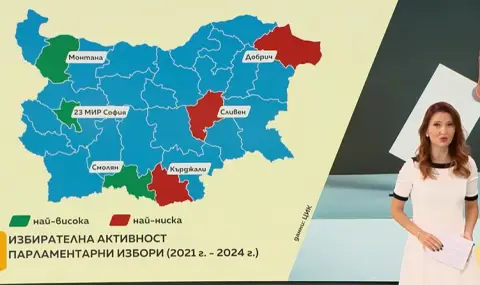Over 600 million BGN we have paid for the series of parliamentary elections in the last three years. The least interested in voting are always in the Kardzhali region, and in the 23rd MIR in Sofia they are always the most active. It is this region that sends the most mandates to the parliament, Nova TV reports.
Constantly declining voter turnout over the past 3 decades has long been no news. However, it seems that since we went through the spiral of early parliamentary elections 3 years ago, the low turnout has become something more – she became a factor. Analysts assign her a leading role this Sunday as well.
The last regular parliamentary elections in our country were held in April 2021. Half of Bulgarians with the right to vote exercised it. Then they were more than 3 million and 300 thousand people. Although not particularly high, the percentage was close to the turnout of the last 15 years. Already in July of the same year, however, – in the first early election of this series, that changed. Voter turnout began to fall. The first time with 8%, then with about 1-2% – it hovered around 40, only to drop in the summer to a record low of 34%. Thus, on June 9, the last National Assembly was elected with the votes of just over 2 million and 200 thousand Bulgarians. The fact that twice the special elections were held jointly with others – once with presidential and once with European parliamentary elections, failed to stimulate the voters further.
There are areas where voters tend to vote more than others. In 5 of the 6 votes so far, the record holder for the highest turnout was the 23rd multi-mandate constituency in Sofia. The second ones are almost always in the Smolyan region, and the third ones – in Montana. The least interested in the parliamentary elections in the last three years are definitely the residents of Kardzhali. They are also record holders in 5 of the 6 votes, but in terms of lowest activity. Traditionally, low interest is also shown in the regions of Dobrich and Sliven.
According to the list, the voters with the right to vote this Sunday are 6 million and 600 thousand. We know that our country is divided into electoral districts, which coincide with administrative districts. As the largest, Sofia is divided into three more, and Plovdiv – on two. Thus, the regions become 31, and to them we also add votes from abroad. The 240 seats in the parliament are allocated precisely on the basis of the number of voters by district. Since the most voters are in the 23rd MIR Sofia – over 420 thousand, this is the region that sends the most representatives to the parliament – 19 in number. The minimum number of deputies that a region can have in the National Assembly is 4. That much will be broadcast from Vidin, where the voters are the least – under 82 thousand.
Over 4,800 candidates will compete to receive our vote on Sunday. Most are men. Women are less than a third. All of them are representatives of almost 30 parties and coalitions. There is also an independent. Nearly 1,200 of the candidates entered their names in the lists of two constituencies. In case they are selected in both, they will have to choose one and in the other they will have to give up their place to the next on the list.
There will again be Bulgarian voters abroad in nearly 60 countries. However, the sections revealed for them are 50 fewer this time. Compared to the last election in the summer, the machines are also 90 fewer. We remind you that whether or not there is a machine in a section depends on the number of voters in it. They must be a minimum of 300. Voters abroad cannot vote with preference because of the distribution of mandates by district. The most sections will again be in Turkey. Their number remains almost unchanged – nearly 170. And the second Great Britain keeps its place, but the third in number this time are the sections in Spain.
The budget that the interim government approved for the early elections this time is in the amount of about 100 million BGN – approximately 2 million more than we spent in June. If we have to calculate how much the entire series of parliamentary elections in the last three years has cost us up to this point, the bill amounts to over half a billion BGN.
No later than October 31, the Central Election Commission must announce the votes received and who will receive how many mandates in the new parliament. November 3 is the date on which the specific names of the new deputies will become known.
